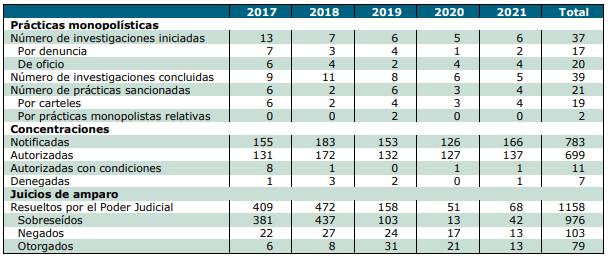Between 2017 and 2021, Mexico‘s Federal Economic Competition Commission (Cofece) initiated 37 investigations for alleged monopolistic practices, and 21 practices were sanctioned, according to a count by the World Trade Organization (WTO).
In some cases, the sanctions were for collusive conduct in the health sector, energy (sale of gasoline to the public) and services (financial services, land transportation for passengers and air transportation in the national territory).
Some relative monopolistic practices were also sanctioned, such as tied sales in the energy sector.
Datos de competencia de la COFECE, 2017-2021
While 699 economic concentrations were authorized, 11 of them with conditions in sectors such as agri-food and digital platforms, seven economic concentrations were denied in the manufacturing, retail and distribution sectors.
What is Cofece’s role? It is the competition authority in all sectors of the economy, except in the telecommunications and broadcasting sectors, in which case the competition authority is the IFT, which has the same powers that Cofece has in the other sectors.
However, although the Federal Economic Competition Law sets the specific competencies of each institution, if there were a discrepancy as to their competence, the conflict would be resolved in the Collegiate Circuit Courts in administrative matters, specialized in economic competition, broadcasting and telecommunications.
Since 2017, four such cases have been resolved in the courts, three of which were related to digital markets.
Cofece
The Political Constitution of the United Mexican States (CPEUM) establishes in Article 28, paragraph fourteen, that Cofece is the autonomous body in charge of guaranteeing free competition and concurrence; as well as preventing, investigating and combating monopolies, monopolistic practices, illicit concentrations and other restrictions to the efficient functioning of markets.
Based on this mandate, Cofece carries out actions that contribute to protect the economy of Mexican families, since, with better competition conditions, they have access to a greater variety and quality of goods and services at lower prices.
Competition generates a virtuous circle that has a positive impact on social welfare. When companies can enter the market and compete, they expand the supply of goods and services so that consumers can choose those that best meet their needs.
![]()

